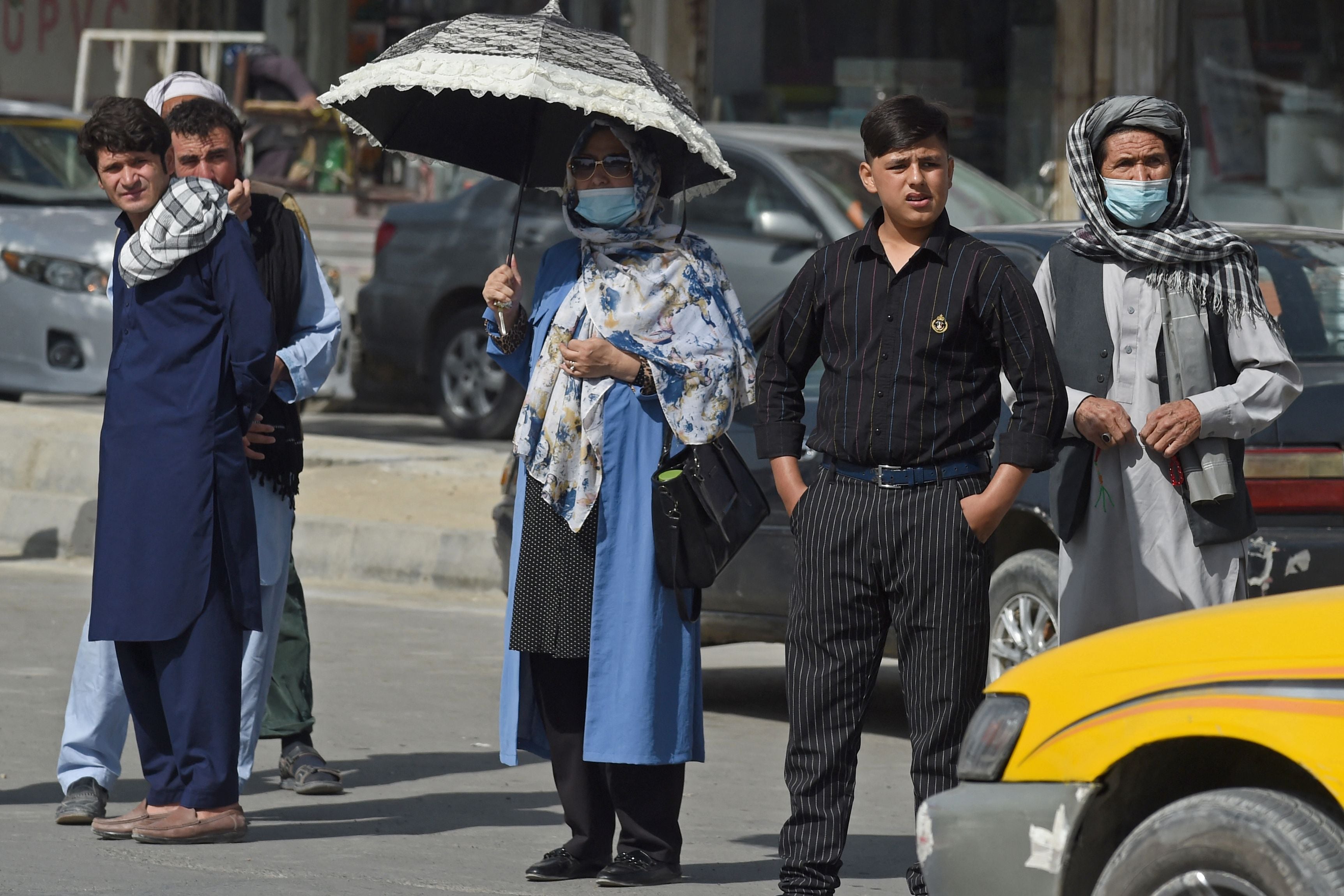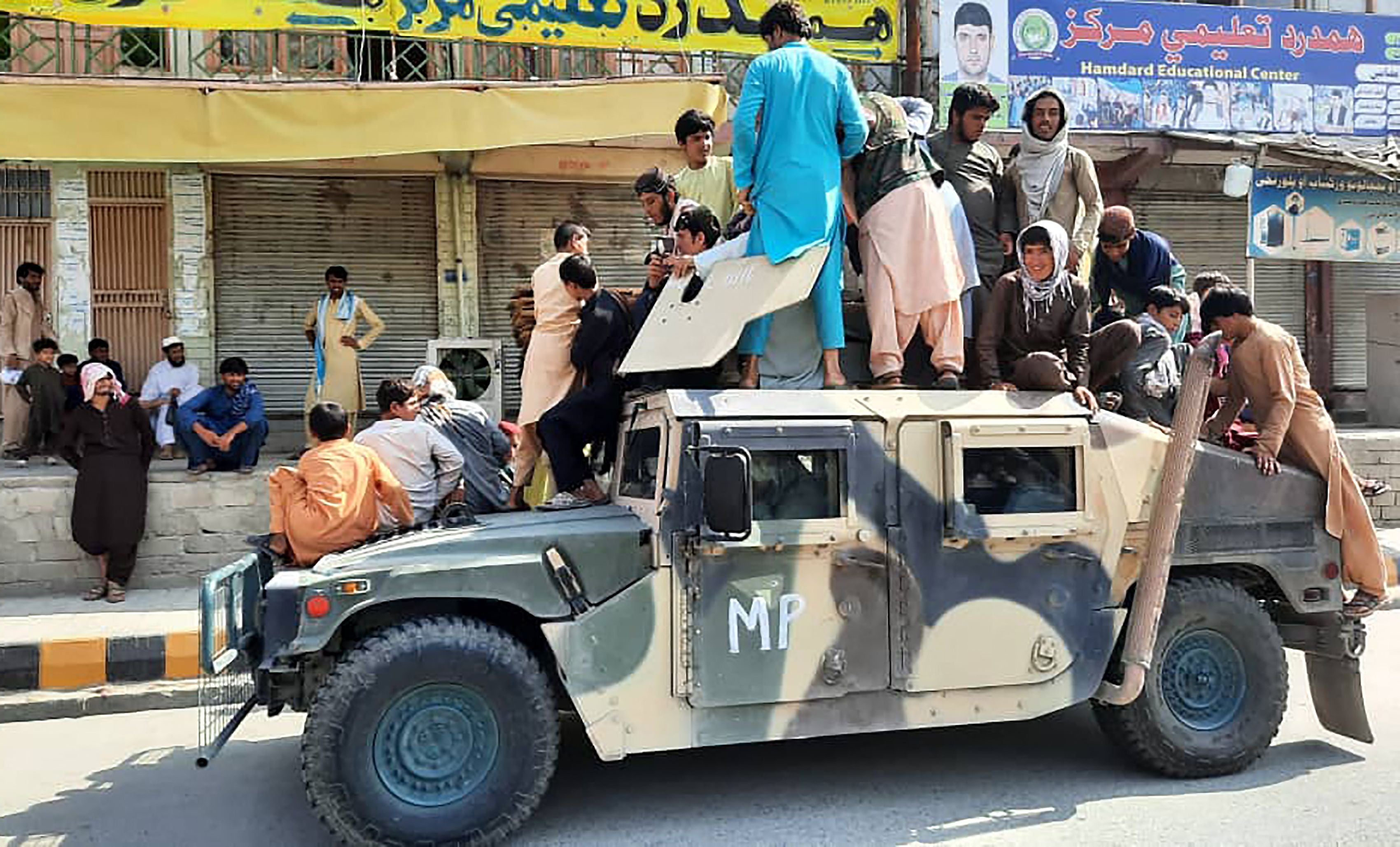Afghanistan president flees country as Taliban takes control of Kabul
Taliban pictured inside presidential palace after Ashraf Ghani flees abroad
The Taliban is in control of Afghanistan 20 years after being overthrown by American and British forces, with its fighters patrolling the streets of Kabul and the country’s president, Ashraf Ghani, fleeing abroad.
The Islamists seized Kabul after capturing the last remaining major cities from the government and tightening the noose around the capital by systematically cutting off every route out to the rest of the country.
There is now deep apprehension of what the future holds for this shattered country in the gathering darkness among many of those who oppose the harsh theocratic rule of the jihadists. The Taliban has assured that no retribution will be taken, but there have been executions in areas under its control such as Spin Boldak and Ghazni.
It was reported in the afternoon that Mr Ghani had flown to Tajikistan along with national security adviser Hamdullah Mohib and other close associates. In a Facebook post later on Sunday, Mr Ghani confirmed he had flown out of Afghanistan and said he had sought to “avoid bloodshed” with the fate of millions of people at stake as the Taliban entered Kabu.
The president, who did not disclose his location, said insurgents now faced an historic test. “The Taliban won victory in the judgment of sword and gun and they have responsibility to protect the honour, prosperity and self-respect of our compatriots,” he said.
Abdullah Abdullah, the head of the Afghan delegation at the talks with the Talibs in the Qatari capital, Doha, who lost to Mr Ghani in a disputed presidential election, commented: “The former president of Afghanistan left Afghanistan, leaving the country in this difficult situation. God should hold him accountable.”
There were claims in the afternoon that Mr Ghani had agreed to resign. There was no confirmation of that, however, though in a recorded speech he said negotiations will lead to a “peaceful transfer of power to the transitional government”.
Zabihullah Mujahid, the Taliban spokesperson, said talks were underway to achieve this. Any “transfer”, however, would mean an effective surrender of power to the Taliban and, with it, all that it is feared will be lost on human rights, equality for women, freedom of expression and the democratic process of government.
Safety, however, was the most immediate concern for the people of Kabul. There were outbreaks of shooting, at first sporadic and then later slightly more sustained, on the streets. Small groups of armed men could be seen in the morning in some of the suburbs, especially on roads coming in from the Logar province.
Further into the city motorcyclists with keffiyehs around their faces took photographs at checkpoints and government buildings, and also of the heavily fortified and supposedly secure “green zone” which has now been largely abandoned.

By late afternoon there was no need for the Talibs to hide their face as they spread through the city centre at the “invitation” of the interior ministry to man posts left by Afghan security forces. The Islamist group said it was ensuring that no looting took place with the breakdown of law and order.
The fighters seemed relaxed in their victory, carrying out minimal checks on vehicles. Soldiers in an Afghan army convoy on the airport road, half a mile from a Talib position, said they had no orders to go into the city.
There were reports that a curfew had been ordered. It was unclear whether it was for 8 or 9pm and it was also unclear who had ordered the curfew. Talib fighters at a checkpoint said they knew nothing about it.
US helicopters flew overhead constantly from the morning. The aircraft, however, were not engaged in combat, but mainly carrying diplomats out of the American embassy to the airport for emergency evacuation.
The Chinooks hovering over the US embassy did not quite, perhaps, mark Afghanistan’s “Saigon moment”. The humiliating departure after defeat in Vietnam is not being fully replicated, with a force of more than 4,600 American and British troops arriving in Afghanistan.
Joe Biden ordered the sending of a thousand more US troops to add to 3,000 already there. Britain has deployed a contingent of 600 led by the 16th Air Assault Brigade.

Late on Sunday it was reported that Kabul airport was closed to commercial flights as military evacuations continued. There were also unconfirmed reports of shooting near the airport.
The Taliban offensive, with its devastating consequences, began after Mr Biden withdrew 2,500 American forces from Afghanistan in great haste, forcing British and other Nato forces to leave as well. Afghans point out ruefully that the president is now prepared to deploy almost twice as many troops for the safety of a handful of Americans than he was to keep a country from the grasp of jihadists.
In an example of the monumental failure of US intelligence about what was to befall Afghanistan, President Biden declared just five weeks ago “the likelihood there’s going to be the Taliban overrunning everything and owning the whole country is highly unlikely”.
In another example of a seeming lack of grasp of reality the US State Department said after a telephone call with Ashraf Ghani on Saturday that Washington was committed to a strong diplomatic and security relationship with the Afghan government. Mr Ghani fled 14 hours later.
Kabul had been gripped by a state of panic in the last few days with the airport jammed to those seeking flights and a rush to buy food and other essentials from stocks in shops dwindling in supplies and rocketing in price. There has been a run on the banks which insist no more cash is available to be given out.
The office of President Ghani issued a statement in the morning, following the outbreaks of shooting, asking the people of Kabul not to be worried as “Afghan and international coalition forces” were in control of the situation.
The US and UK have repeatedly stressed that their forces would not get involved in the fighting, and it remained unclear why the president’s office felt that the two countries would want to stoke the dying embers of the civil war.
The insurgents have been careful not to attack American and other western troops under the terms of the Doha Agreement, focusing their deadly attacks on the Afghan security forces. There have been repeated warnings of retribution from Washington if that changes.
The Taliban in a statement in the morning said it was undecided on whether to launch an assault on the capital. A “separate decision will be taken later”, said the group’s spokesperson Zabihullah Mujahid. However, he added, “people should be assured that we don’t want a state of war in Kabul or, God forbid, anyone to be harmed”.
The group later issued a second statement promising that “no one’s life, property and dignity will be harmed and lives of the citizens of Kabul will not be at risk”. Afghans have, however, heard assurances of an end to violence quite a lot recently, only to have hopes of that dashed.
I was thinking this morning that I am 20 years old, I was born the year the Taliban rule ended. The life I wanted will end now, 20 years later
Waleed Mohammed Hamidullah, a 48-year-old businessman, standing in frustration in front of a shut bank, said: “We are very, very nervous about what is going to happen. There is nowhere we can go because, as you know, Kabul has been surrounded. I tried to draw some money out to buy airline tickets on the black market, but as you can see it is now shut. I’ll try again tomorrow, but I am not hopeful.”
Abdul Karim Huseini had only managed to buy half of the food he felt his family needed for the days ahead. “People had been buying in bulk. I have got family members who came from other parts of the country staying with me, I don’t think I have enough for us all now,” he said. “These are terrible times, we want an end to the fighting.”
Afshaneh Ansari also wants an end to the violence. But the coming Taliban rule means that the life she has dreamt of and devoted so much to achieve will be gone.
“I wanted to be an artist trying to fuse Afghan and western art. I am also an activist on gender issues,” said the student at Kabul University. “I don’t think that will be possible now, not in Afghanistan.
“I was thinking this morning that I am 20 years old, I was born the year the Taliban rule ended. The life I wanted will end now, 20 years later.”
Join our commenting forum
Join thought-provoking conversations, follow other Independent readers and see their replies
Comments
Bookmark popover
Removed from bookmarks